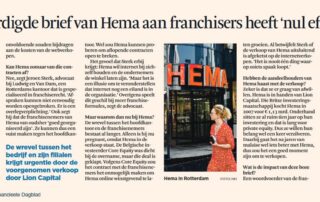Prognosis problems: sound location research?
Recently, the Arnhem Court of Appeal ruled in a case in which the soundness of forecasts provided and the underlying location research was called into question. In the present case, the Court of Appeal has confirmed the prevailing line in case law on the prognosis problem. Furthermore, the Court of Appeal ruled that in a location survey that was drawn up before a shopping center has been (fully) realized, it may be assumed under certain circumstances that the shopping center is fully developed.
In summary, the following rules can be derived from the current case law on the prognosis problem:
1. If a franchisor provides forecasts, these must be based on a proper location report;
2. The mere fact that forecasts are not achieved does not justify the conclusion that the underlying business location survey is based on faulty assumptions.
In the recent judgment of the Arnhem Court of Appeal, the franchisor had provided turnover forecasts to the franchisee. These turnover forecasts were based on a location survey, the soundness of which was questioned by the franchisee.
In the aforementioned judgment, the Court of Appeal confirmed that the mere failure to meet the forecasts does not justify the conclusion that the investigation is not sound.
The location survey and the forecasts based on it are alleged to be (partly) unsound, because the forecasts do not take into account the fact that the shopping center was still under development. The location study was based on the assumption that the shopping center would be realized in its entirety. The Court of Appeal has ruled that in principle this starting point does not have to lead to the conclusion that this is unsound. The Court of Appeal came to the aforementioned judgment because in the present case the location investigation itself showed that the shopping center was still under development at the time the investigation was drawn up. The location survey itself also showed that the starting point of the survey was that the shopping center would have been fully realized. The location survey also did not state a completion date, from which the franchisee could derive that the shopping center would be ready at some point. The Court of Appeal ruled that since the location investigation explicitly reported the aforementioned facts, and thus did not conceal anything on these points, it could not come as a surprise to the franchisee that the shopping center was not yet ready. In addition, the franchisee could have simply visited the location to have a look. That the shopping center was and could be still under development was known or should have been known to the franchisee.
It can be concluded that this judgment is a confirmation of the standard jurisprudence in the field of prognosis issues, with an addition with regard to shopping centers that are still under development when drawing up forecasts.
Ludwig & Van Dam franchise attorneys, franchise legal advice

Other messages
HEMA in conflict with franchisees about e-commerce agreements
On 18 July 2018, the District Court of Amsterdam, ECLI:NL:RBAMS:2018:5098, rendered a judgment in proceedings on the merits in which the franchisees were largely ruled in favor of e-commerce.
mr. J. Sterk about HEMA conflict in the FD 18 July 2018
mr. J. Sterk about HEMA conflict in the FD.
Column Franchise+ – “Legal Franchise Statistics 2018”
The Legal Franchise Statistics have been compiled for 10 years by Ludwig & Van Dam attorneys on the basis of all published judgments of judges.
Franchisor prohibits opening (franchise) company
A franchisor applied for interim measures to prohibit a franchisee from opening a franchisee's business.
Column Snack courier no. 8: “With 7 steps you comply with the privacy law”
Much has already been written about the General Data Protection Regulation (GDPR). The law has been applicable since 25 May, but many companies have not yet had their privacy policy in order.
Forced to switch to a different franchise formula at the existing location?
If a franchise formula ceases to exist, for example if it is incorporated into another organization, the question may be whether the franchisee is also obliged to be incorporated into







